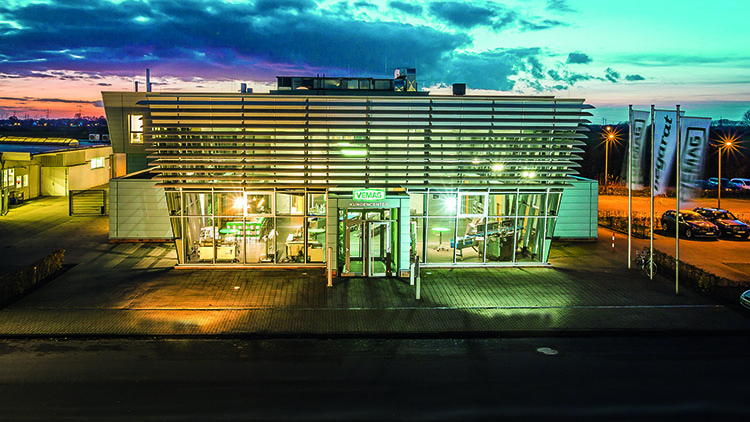
Every gram counts. This is especially true when raw materials become more expensive or even scarce. VEMAG takes weight accuracy very seriously with its portioning technology. The machine manufacturer also sets the bar high in terms of product quality and flexibility.
By Helga Baumfalk
With systems and machines that perform tasks such as portioning, forming and dosing, VEMAG Maschinenbau GmbH is represented in many sectors of food production. The spectrum ranges from butcheries and dairies, the production of snacks/protein bars, confectionery, or plant-based products to pet food and, of course, bakeries.
“Passion for products – that describes us pretty aptly,” explains Managing Director Christoph Thelen. “By that, we don’t mean our products, but those of our customers. Orientation to the end product has always been important to us. In recent years, we’ve further expanded our focus on the respective industries and aligned our development accordingly with our own teams of specialists.”
Around 20 employees work at VEMAG for the bakery sector alone, including master bakers, bakery technicians and food technologists who are active in the BIC, the new Bakery Innovation Center (see box). Separate testing and competence centers have also been set up for other food and non-food sectors at the company’s headquarters in Verden, Germany. “Different industries have different requirements,” observes Alexander Bressler, Product Manager, Sales, Bakery. With test centers appropriately equipped to meet the respective requirements, it is possible to respond individually to customers’ needs, he adds. “Our goal is to communicate with all our customers at eye level,” says Thelen. This is why it isn’t unusual for many people in the company to have a ‘food background‘.
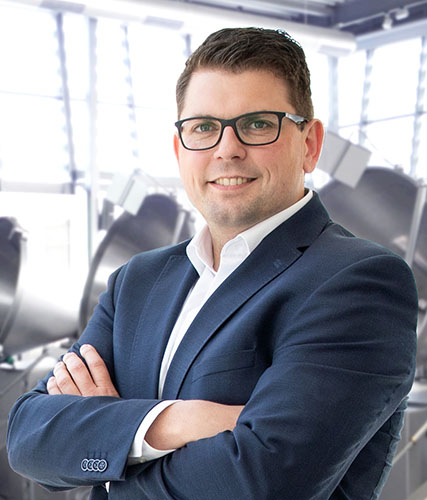
“Despite the challenges posed by the war in Ukraine and the pandemic, we have managed to continue our overall growth. Here we benefit from our broad-based structure and proximity to international markets through our agencies.”
Christoph Thelen, Managing Director, VEMAG
Since 2001, VEMAG has been a part of the US-based Robert Reiser & Co of Canton, MA. Reiser itself does not build any machines and gives its German subsidiary free rein in the management of the company. Both are in a kind of supplier-customer relationship with each other. VEMAG manufactures, Reiser sells the equipment – and that of other manufacturers – in the USA, Canada and the UK. Similarly, VEMAG works with other independent agencies and its own subsidiaries, e.g. in China, the Netherlands, or Poland, through which the machine builder is represented in more than 120 countries worldwide.
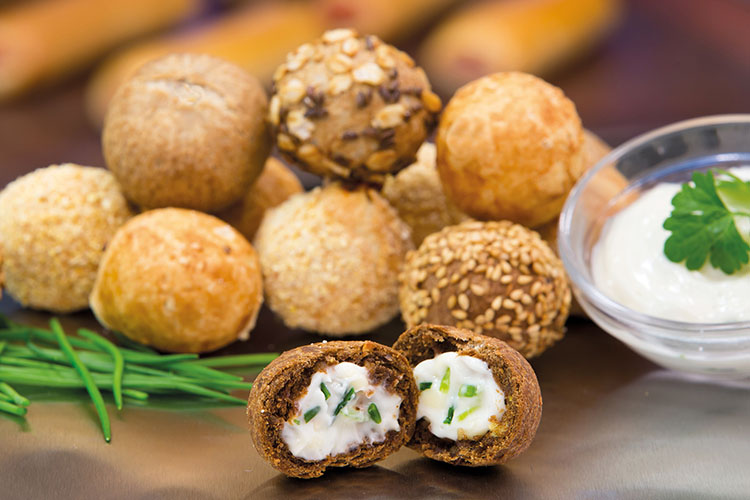
A functioning after-sales system is important, says Christoph Thelen. No one can afford downtime, he adds. “When it comes to service, we don’t differentiate by industry, because the technology is similar.” In export markets, agency technicians are responsible for maintenance and service. All service personnel are trained at the VEMAG Academy in Verden.
More than 80% export share
At over 80%, the company’s export share is high. North America, the UK and European countries such as the Netherlands, France and Poland are among the main sales markets. The company is also successful in the South American markets, as well as in South Africa, China and Australia. Thelen: “Despite the challenges posed by the war in Ukraine and the pandemic, we have managed to continue our overall growth. Here we benefit from our broad-based structure and proximity to international markets through our agencies.”
From approximately 840 employees, around 400 work in production and assembly. In line production, they build up to 1,800 systems and machines per year with a five-day week. Added to this are the respective accessories. Controls, motors, or various auxiliary parts are outsourced. Everything else – from sheet metal and surface processing to welding and assembly work – takes place at the plant in Verden. The high level of vertical integration creates independence and allows the company to respond more quickly to inquiries. In addition to the series production business, there is also the ‘customised construction department‘, which develops customized solutions.
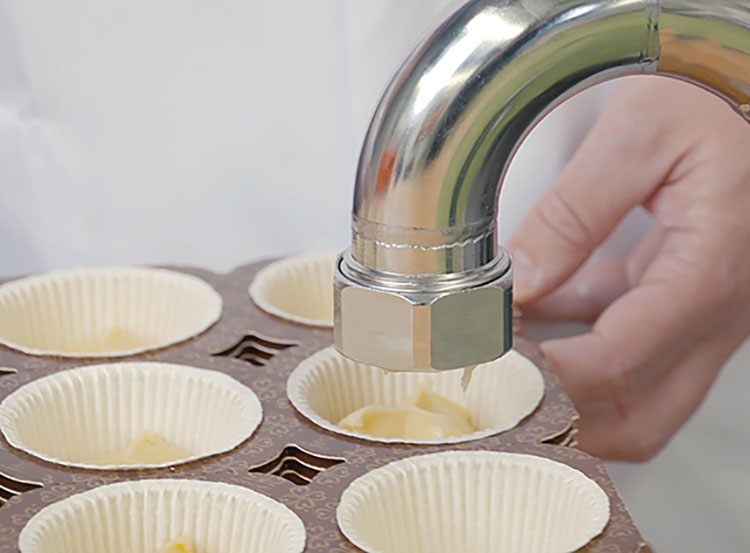
The bakery all-rounder
It is one of the latest developments from VEMAG: the HP1 or better said, the bakery all-rounder. The dough portioner is designed for medium-sized artisan bakeries. It can convey thin or stiff masses even with pieces (according to the company, without losing volume or destroying pieces) and divide or dose doughs with a dough yield of 155 to 220 just as well. The machine operates in a weight range from 5 g to 50 kg. “One customer where it is already in use is using it to produce 25-gram cookies for food retailers,” Alexander Bressler tells us. “He could just as easily run his bread doughs over it.” The dough portioner can be combined with various attachments. One attachment can be used, for example, to fill sponge cake and stirring masses into molds or cake rings with weight accuracy. “The attachments give the baker product flexibility with one system,” Bressler said. The hand-filling head could be used to dress macarons, meringues and macaroons, or to fill masses into jars. As for the variety of shapes, that is almost infinite, he says.
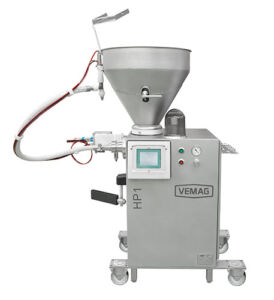
Procurement is a topic that can currently become a challenge for all companies worldwide. Christoph Thelen: “We are not completely spared either. Nevertheless, with our vertical integration and because we work in partnership with our suppliers, who we hold in high esteem, we manage to maintain the supply chains, even if this ties up a lot of resources at the moment.”
Part of VEMAG’s philosophy is to keep spare parts available for customers via a spare parts warehouse. Thelen: “If a part is defective, it is needed immediately. In the foreign markets, the agencies stock up. It is also part of our philosophy that we do not discontinue spare parts.”
Tower clocks and honey extractors
VEMAG grew up with filling machines for butchers. The company’s history actually began in 1944 with the manufacture of church clocks and honey extractors. They then ventured into the baking industry, 36 years ago. Alexander Bressler: “In the baked goods sector, we are traditionally represented worldwide primarily in large bakeries and with industrial customers with monolines. They are mainly used to portion pizza, toast, and sandwich doughs or stick breads in high quantities with weight accuracy and without oil. Meanwhile, we are going a step further in the direction of craftsmanship and last year developed a small, flexible solution. We call it a ‘bakery all-rounder‘ because it can be used across production and products – in both the pastry and bread sectors.”
“Smaller companies, in particular,” explains Christoph Thelen, “do not buy machines, they buy solutions. The more applications they can cover with one machine, the better, if only to minimize the footprint. Space is at a premium.” He observes that bakeries of all sizes are paying more attention to efficiency in output rates and raw material use against the backdrop of increasingly expensive resources. The hygienic design of a portioning machine is also playing a greater role, he says. “Because our origins are in the butchery sector, hygiene has been a high priority for us from the outset. That’s why all our equipment is wet-cleanable. Cleaning time can be set up, it should be short,” says Thelen.
Double screw are high-performance tools
Every dough divider from VEMAG has a modular design. It consists of a basic unit and an attachment that divides, shapes and doses the doughs or masses accordingly –whether onto a conveyor belt, a tray, into baking molds, or cake rings. The technical heart of the portioners, in turn, are the double screws. They gently convey the masses or doughs – which, according to the company, works without the usually needed separating oil/separating flour, with the greatest possible product protection and preservation of an excellent final pastry quality. “We are constantly working on further developments in this area,” reports Alexander Bressler. All machine components are manufactured with the highest precision.

”You can portion a huge range of products with a single line. I see our great strength in this flexibility. “
Alexander Bressler, Product Manager Sales Bakery, VEMAG
Bressler: “One system can portion a huge range of products, whether mixed rye bread and sandwich bread, gluten-free doughs, solid bar masses, but also sand or sponge cake masses and many other doughs and masses. I see our great strength in this flexibility.”
Currently, the bakery sector accounts for about 10% of total sales at VEMAG. “We want to expand this,” says Christoph Thelen, “because we see great potential and synergies resulting from our expertise in other sectors. My goal is that at some point it can be said, ‘VEMAG stands for bakery.‘ And then it should not be followed by, ‘You come from the butchery sector,‘ but rather, ‘And I think you also make systems for the butchery sector.‘”
The BIC
The BIC, the Bakery Innovation Center, was put into operation by VEMAG in 2021. In addition to portioning machines, all upstream and downstream bakery process equipment is located on the premises. Kneaders are part of it, as well as processing technology, proofing cabinets, ovens and refrigeration technology. Cameras can be used to follow processes in the BIC online if required. The machine manufacturer makes the BIC available to customers for test runs or to try out new product ideas, as well as using it for its own development work, on-site training courses and webinars.


